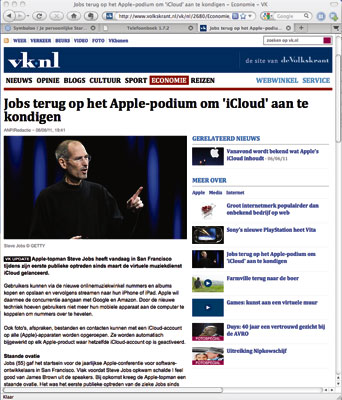According to TU Delft researchers, cloud computing is a blessing in disguise. Files can indeed be more easily stored and synchronised, making large computations faster. Hackers however can also abuse these advantages to crash servers and blackmail companies.
Cloud computing is rapidly taking over the world of file-storage. One can use several online computers (a cloud) to store information and synchronise it with mobile phones, tablets, desk- and laptops. This week in the Netherlands, Samsung introduced Chromebook, a laptop that stores music, documents and pictures online, using Google’s cloud-service Chrome. This month Apple presented iCloud, which will be introduced this fall. And Amazon also has a cloud-service.
There are plenty advantages: files are more easily accessible, computers run faster and there is more storage available. However, the disadvantages were also noted, especially regarding privacy. Who can also access private tax, photos, bank and creditcard files? “But there has almost been no criticism so far on how clouds can be used by hackers. That’s why cloud computing also is a blessing in disguise at the moment,” states PhD student, Kassidy Clark MSc (Technology, Policy and Management). “Hackers have the same advantages as consumers. Clouds are robust, fast and easily accessible. And they make them able to use thousands of computers at the same time to attack.”
To prove this point, Clark set up a botcloud – a network of computers used for mischief. “With a simple ten line script creating twenty virtual computers we were able to bring a server down in under ten seconds.”
“This is being done by political groups that attack government websites for example. Or by hackers that blackmail banks, by threatening to put down the site,” adds Clark’s supervisor, Dr Martijn Warnier.
Clark also showed how easy clickfraud is made by cloud computing. “Whenever someone clicks on a sponsored link, the company pays. Competition could use a cloud to click on the links, so their rival has to pay a lot of money. There are programs to prevent this from happening, but they check the IP-address (the unique identification code of a computer). With cloud computing, one can use as many computers and IP-addresses as possible. If one uses a stolen credit card to set up a cloud, it doesn’t even cost a thing. We set up a botcloud of a thousand virtual computers, with each of them having its own address. They were not detected nor shut down.”
The recent Playstation Network hack proves Clark’s point. The credit card information of tens of millions of consumers was stolen. “This was done by using cloud computing. This year there will be many more attacks of this scale,” predicts Clark.
The million-dollar question is what could be done to prevent cloud computing from becoming a hackers dream. “One could do a hundred percent check of what goes on in the clouds,” says Warnier. “But this is difficult regarding the violation of privacy. Cloud service providers also do not know who their consumers are. One only needs a (stolen) credit card. It would be safer if people have to go to an office to identify themselves, but this will make it more complicated to get an account and therefore no provider would like to implement this. It’s too risky. If one provider implies these rules, consumers will go to another one. Therefore, we need worldwide legislation. But it’s very difficult to achieve this. There are no easy solutions.”
‘Een beter leven’
“Ik wil een beter leven. Studeren zodat ik mezelf kan onderhouden. Ik houd van dingen die je elke dag gebruikt en die met industrieel ontwerpen te maken hebben. Ik heb voor Delft gekozen omdat het hier technischer is. In Eindhoven is het artistieker.”
De in Slowakije geboren Smisek heeft tot nu toe vooral indrukken opgedaan van de faculteit en de studie. “Tijdens de Owee was ik nog in Slowakije. Ik ken dus nog niet zo veel mensen, maar dat is geen probleem. Ik zoek zelf vrienden. Het hoeven er niet veel te zijn, wel goede.”
Bij IO heeft Smisek het erg naar zijn zin. “Gezellig. Ook de docenten zijn leuk. Ze maken grapjes en zijn ontspannen.” Zowel het tekenen als de colleges bevielen hem. “Er is nog niets dat niet leuk was. Misschien dat er bij IO zo weinig zitplaatsen zijn tijdens de lunch.” Hard weken hoefde hij nog niet. “Maar het begint nu pas. Ik heb net de eerste echte opdracht gehad. We moeten iets ontwerpen en er een prototype van maken.”
Eigenlijk, vindt Smisek, is er tot nu toe maar een minpuntje. “Ik heb nog geen kamer.” Geen ramp, want hij woont in Den Haag. “Maar ik zoek er wel een in Delft, want nu moet ik elke ochtend om zes uur op om op tijd hier te zijn.”



Comments are closed.